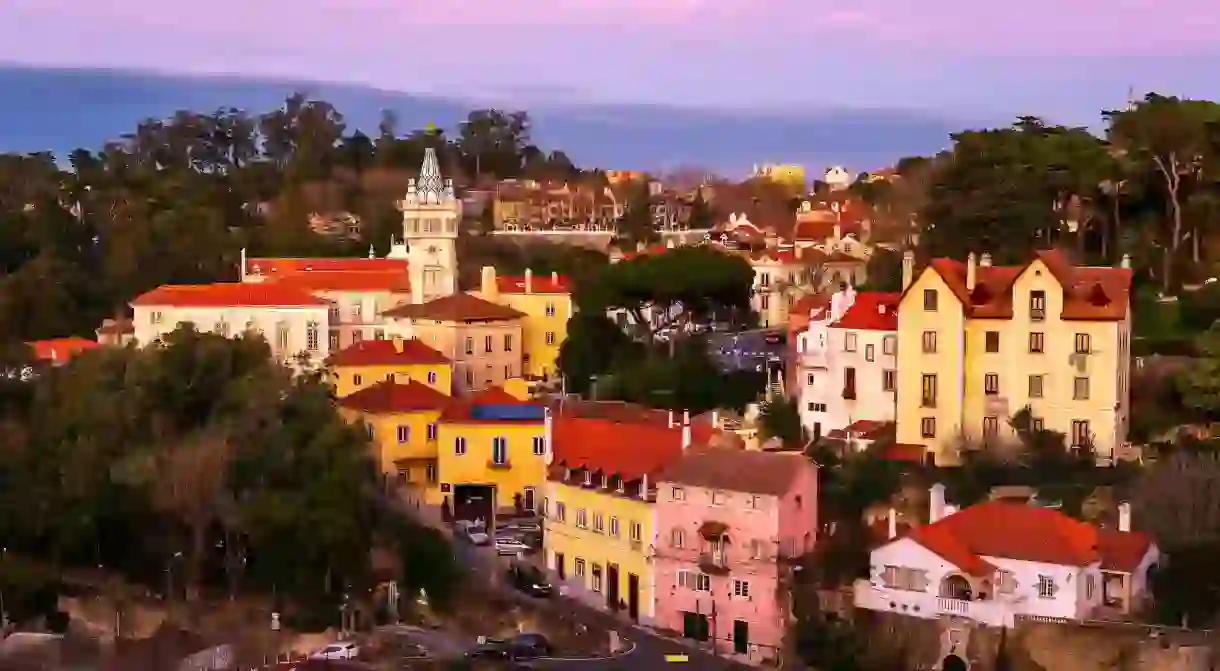The 11 Best Day Trips from Lisbon

If you’re visiting Lisbon and fancy a day out, the you’ve come to the right place. From natural havens to Unesco World Heritage sites, this culturally rich country has lots to see and do close to the capital. We pick the best.
Sintra
Botanical Garden, Building, Ruins, Natural Feature

There are many pretty towns and villages in Portugal, but none quite like Sintra. Once the designated holiday resort for Portuguese royals and aristocrats, the small town is filled with palaces and estates that will make you feel as if you are living a fantasy, free to stroll the once private gardens surrounding the rich manors, now open to everyone. Aside from treats for the eyes, the city is also known for its customary pastry, which you can try at any typical cafe in the city centre, with a side of local friendliness. Right next to the town, there is Cabo da Roca. The immense cliffs that were once the terror of Portuguese sailors and are now the delight of worldwide travellers due to incredible views of the Atlantic Ocean. There are many ways to visit Sintra, but, since there is so much to see and so little time, the best option is to go on a tour with experts who make sure that nothing is missed.
Arrábida Climbing Experience
Natural Feature

The Serra da Arrabida is just an hour away from Lisbon and a world apart from the capital. Separating land from ocean, this mountain range is a popular hiking spot, with incredible views, especially if you make it to the peak. More adventurous souls may opt to climb the mountain, with several routes on offer to tackle with local experts. They take care of the equipment and the pick-up, so you can focus on getting to the top.
Arrábida and Sesimbra
Natural Feature

Adding to its natural beauty, the Arrábida mountain range is surrounded by vineyards and delightful little towns, all deserving of a visit (and a taste). The pretty fishing village of Sesimbra has a long beachfront where local restaurants prepare the fresh catch of the day. Nearby Azeitão is known for its strong-flavoured creamy cheese and long-established wineries. Try not to eat too much so you can enjoy a swim afterwards at the stunning Portinho da Arrábida beach.
Berlengas Islands
Natural Feature
Arrábida Kayak Tour
Natural Feature

The beaches dotting the Arrábida shore are a popular destination in the summer months, making it a parking hell for incautious drivers due to its narrow-ridge roads. That’s why visiting by sea is a much better idea. Alongside access to the beautiful small beaches popular with locals, this divine coastline also has caves and secluded beaches that can only be reached by boat, begging for exploration. There are kayaks for rent at Figueirinha Beac.
Porto
Historical Landmark

If you haven’t visited Porto and aren’t planning on making it a holiday destination in the near future, then you might want to consider taking a day trip from Lisbon. Although most of its fame comes from its port wine, Portugal’s second-largest city’s charms go well beyond its historic wine cellars. A stopover for wine tasting is de rigueur, but so is taking a stroll along the Douro River, for the spectacular views, and the Avenida dos Aliados (Aliados Avenue), for the architectural treats of the Trindade Church and the São Bento Station. Also not to be missed is the Serralves Museum of Contemporary Art, one of the most important contemporary art museums in Portugal, located on the magnificent Serralves Estate. There are daily flights and regular trains from Lisbon to Porto, but, to make the most of your day, travelling with a guide might be the best option.
Paiva Walkways
Natural Feature, Park

The Arouca Geopark, recognised by Unesco as Heritage of Humanity, is an untouched natural haven offering sanctuary to many endangered species such as the Iberian wolf. Running through it is the best preserved river in Portugal, the Paiva River, known for its clean and wild waters. To make it accessible to visitors, and to help with conservation efforts, an 8km (5mi)-long suspended wooden walkway was built along the river, allowing for a delightful hike encompassed by spectacular landscapes. Even though any time is a good time to visit, the summer months are better for enjoying the three river beaches that the walkway gives access to. The easiest way to get to the Paiva Walkways is by booking a tour – they’ll pick you up at your Lisbon hotel, drop you at the starting point and wait while you marvel at nature.
Knights Templar City
Cathedral, Church, Ruins, Synagogue

The Knights Templar – the warrior monks in white mantles with a red cross – were famous in the ancient world for their crucial role in the Crusades. Wrapped in mystery, the order’s secrets spawned tales and legends that survived through the ages, unlike the order itself. It was extinguished by the pope in the 14th century, everywhere in the world except in Portugal. The Portuguese king chose to protect the Templars and give them refuge, changing their name to Order of the Christ. The Templars mark in Portugal is mostly felt in the city of Tomar, the order’s Iberian capital, founded by their grandmaster in 1160. Its main monument is the Convent of Christ, a Unesco World Heritage site and one of the country’s most beautiful monuments, set inside the city’s heavily fortified castle where you can get a glimpse of how the monks lived and experience the order’s mystique. The best way to get here from Lisbon is by renting a car, or, better yet, by booking a tour – that way you’ll get to visit with a knowledgeable guide.
National Palace of Pena
Building, Monastery, Park

Óbidos and Fátima
Historical Landmark

Wine tour around Lisbon
Cathedral, Museum, Natural Feature














